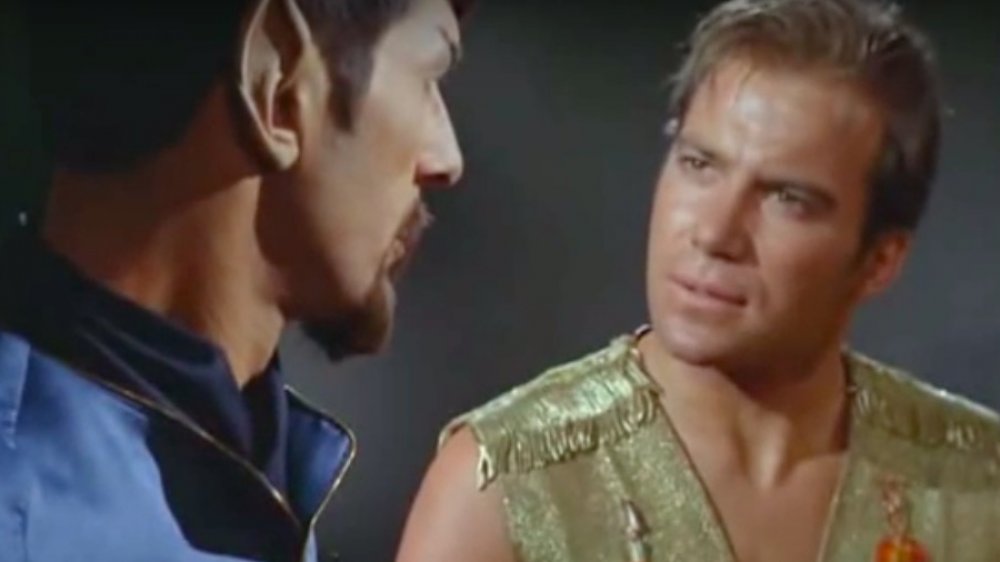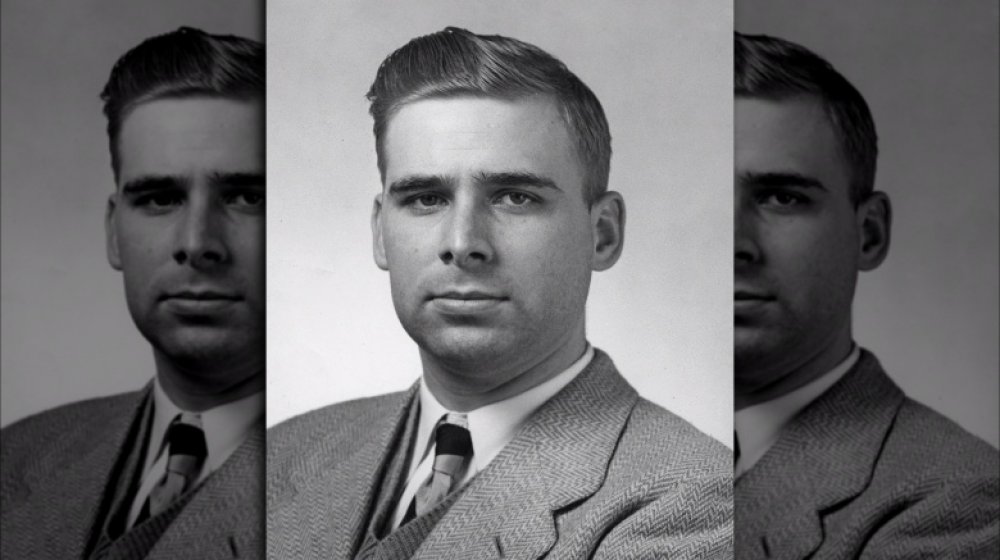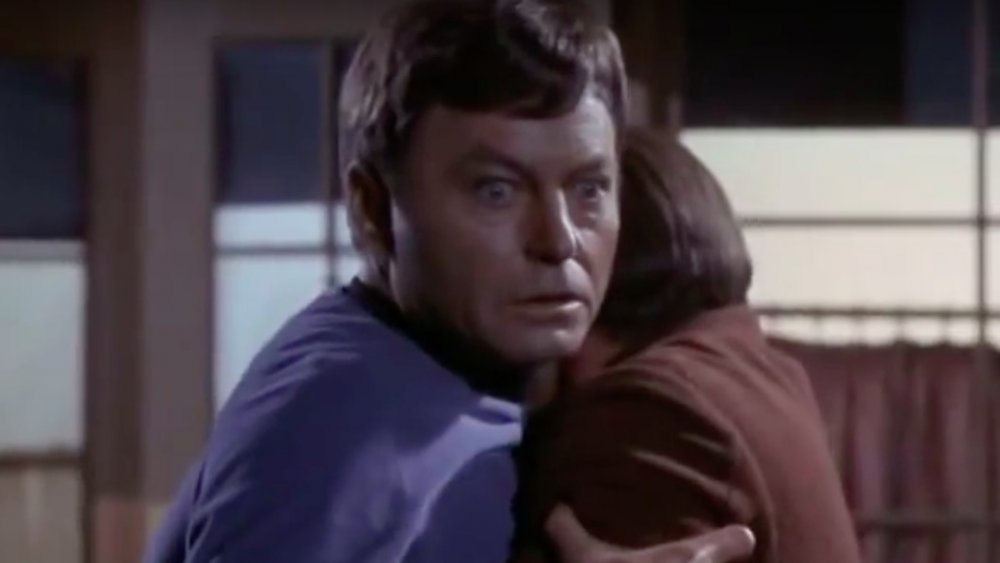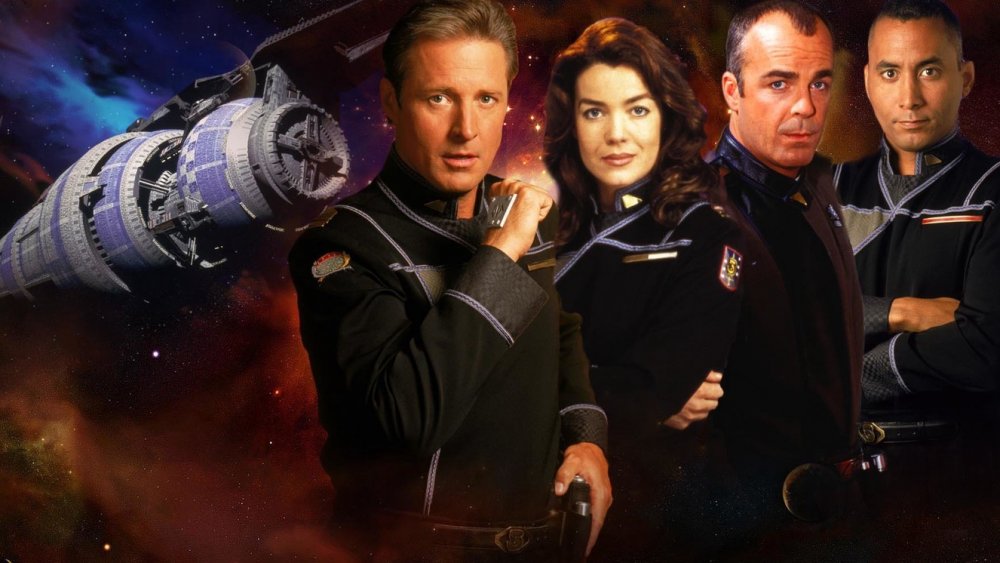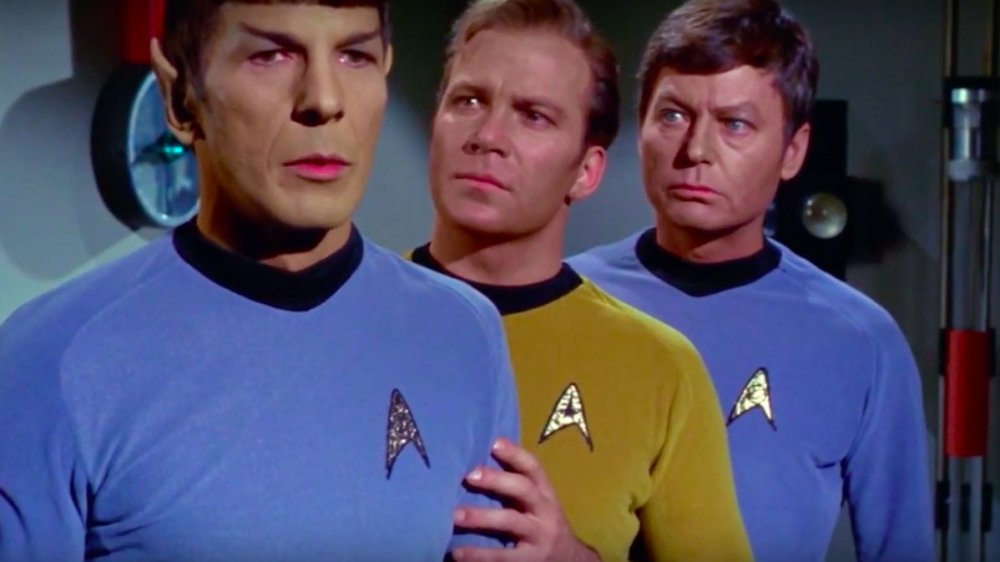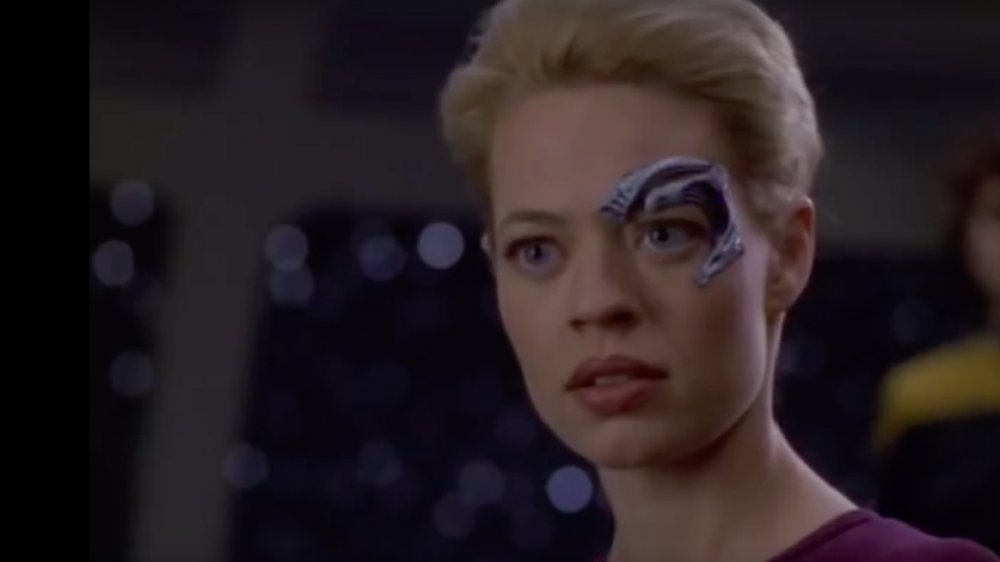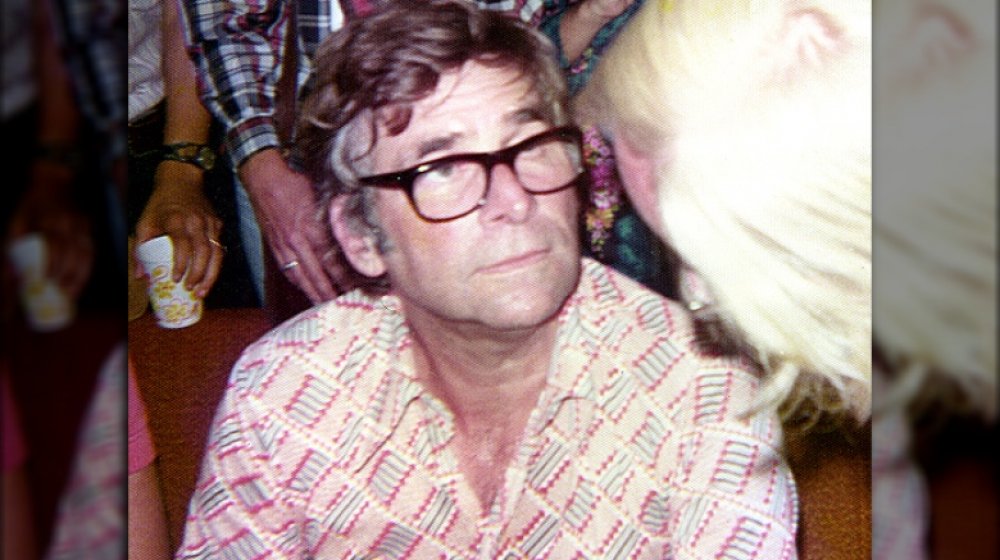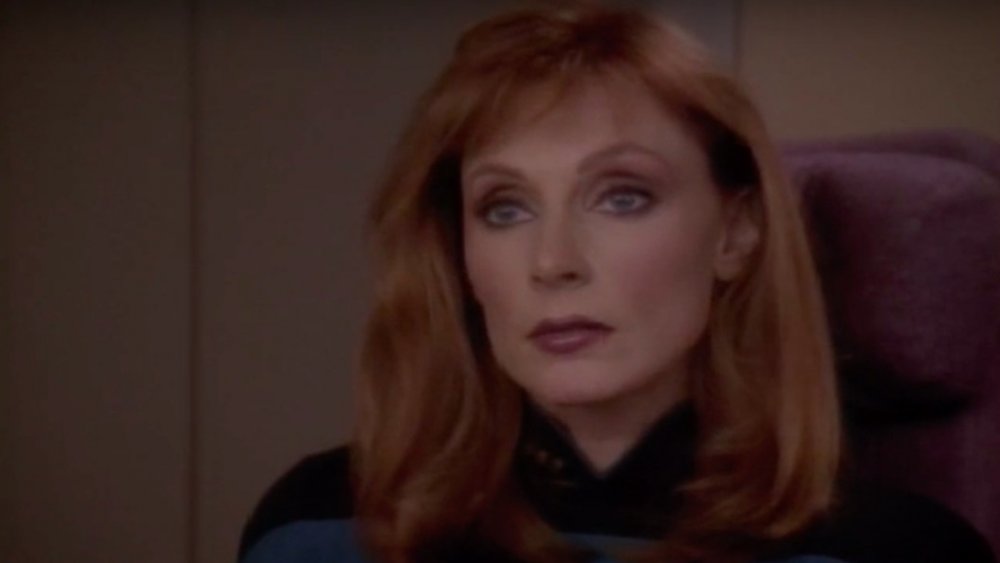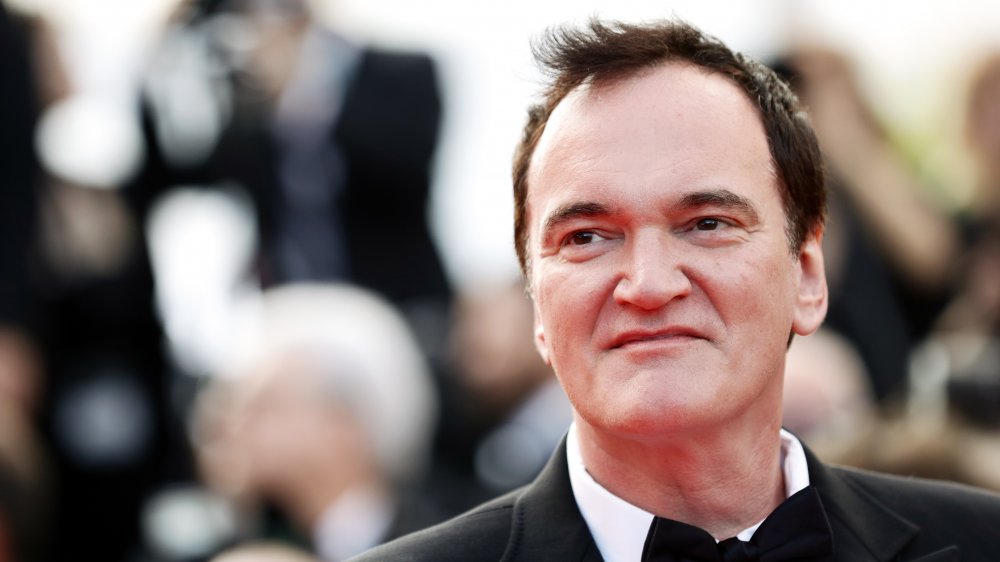The Biggest Scandals To Hit The Star Trek Universe
On-screen, it was every space geek's dream. A starship travels through the cosmos, encountering alien races, exotic worlds, scantily-clad green women, and creatures that are clearly made out of styrofoam. Off-screen, it was even more exciting, though not necessarily in a good way.
Just about every popular entertainment franchise has had its share of scandal. Human beings, especially that strange variety that lives and works in Hollywood, just can't seem to stay out of trouble, and Star Trek actors were certainly no exception.
In the early days the Star Trek franchise was pretty over-the-top as far as its scandals were concerned. But hey, most everything Star Trek ever did was kind of over the top, so maybe it was just trying to maintain its image. From systemic misogyny to Gene Roddenberry actually turning out to be not a super cool dude after all, here are some of the worst scandals to boldly go where no scandal has gone before.
Star Trek's creator Gene Roddenberry was a sexist jerk
We all really wanted to love Gene Roddenberry, the genius who brought Mr. Spock and Captain Kirk to the world, the guy who made sci-fi an institution, the grandfather of crappy special effects. But we can't love Gene Roddenberry because he was a sexist jerk. Go ahead, take some time out to reel in shock.
Okay so maybe that doesn't come as a huge surprise. The original Star Trek often featured women in skirts so short that bending over to retrieve a fumbled communicator was, like, never an option, ever, and most of the women in those early episodes weren't exactly the strong, self-sufficient Sarah Connor type, either. And that's probably because Gene Roddenberry didn't really respect women all that much.
Pre-Hollywood, Roddenberry was already famous for having affairs with secretaries, and once he was firmly established in Hollywood, there was no stopping him. Roddenberry was married, but his relationship with actress Majel Barrett wasn't exactly a secret. According to the National Review, he also had an affair with Nichelle Nichols, who played Star Trek's Uhura. One of screenwriter Gene Coon's former assistants called Roddenberry "a sexist, manipulative person who disregarded women," adding that "he would have women walking from Bill Theiss's fitting rooms through to his office in the skimpiest outfits so he could perv them." So admire Roddenberry's vision — it was definitely worthy of respect. But the man himself, not so much.
No, George Takei was not cool with Sulu's news
George Takei, who played Sulu in the original Star Trek and in the first series of films, is openly and unapologetically gay, and a fearless champion of LGBTQ rights. And for some reason, that made screenwriter Simon Pegg think Sulu ought to be gay, too. Pegg wrote a scene for Star Trek Beyond in which Sulu is depicted raising a child with a male partner. It was meant to be a respectful homage to Takei, who came out in 2005, though he'd been advocating for the LGBTQ community long before that. Everyone thought that Takei would love the new direction for the character, but alas, he didn't.
"I'm delighted that there's a gay character," he told The Hollywood Reporter. "Unfortunately it's a twisting of Gene [Roddenberry's] creation, to which he put in so much thought. I think it's really unfortunate."
Roddenberry, says Takei, never envisioned Sulu as being gay, even though he was a supporter of LGBTQ rights even before all those initials existed. When Takei found out about the new plans for the character, he tried to convince actor John Cho (who plays Sulu in the reboots) that a completely new, gay character would be a better choice. After all, if Sulu did turn out to be gay it's pretty clear that he was in the closet all those years, and it's hard to imagine that in the 23rd century there would still be any such thing as a closet.
No feature-length Star Trek fanfic movies allowed
Every major franchise that boasts rabid fans is going to inspire fan fiction. Some creators love and encourage fan fiction (Rebecca Sugar, who created Steven Universe, is one of them), while some of them find it endlessly annoying and call it copyright infringement. The Star Trek franchise leans towards the latter.
They've been tolerant, though. Sort of. There's a list of guidelines that fan filmmakers should follow if they want to produce a Star Trek fan film — the guidelines limit all such films to no more than two 15 minute episodes, no bootleg props or costumes (official only!), no professional actors, producers, or otherwise, no fundraising in excess of $50,000, and no distribution for profit. So you can make a film, but you can't make money off of it. You can, however, help enrich the franchise by only using official merchandise. So.
According to The Verge, at least one production outfit broke the rules — Axanar was slated to be a feature-length film (that's one broken rule), starred Richard Hatch and Kate Vernon from Battlestar Galactica and Tony Todd from The Flash (two broken rules), and had a million dollars in crowdsourced money to back it up (three broken rules). Unsurprisingly, Paramount and CBS cried "not cool" and took the filmmakers to court, and the filmmakers lost. Under the terms of the settlement, Axanar can go forward ... but only as two 15 minute installments. Time to rewrite the script.
The Star Trek grudge on the Edge of Forever
Gene Roddenberry was rarely happy with any script anyone gave him. Okay, so that's understandable. Star Trek was his baby, his vision, and it's really hard for other writers to get into the head of a visionary and produce work that precisely lines up with the visionary's standards.
According to Vox, "Star Trek's greatest episode" was "The City on the Edge of Forever," a time-traveling tale written by Harlan Ellison. The script accomplished all of the things we love about Star Trek — it had important themes and a meaningful story, but it had largely been rewritten by — you guessed it — Gene Roddenberry (though to be fair, D.C. Fontana, Gene Coon, and Steven W. Carabatsos also had a hand in the rewrite, which is why it didn't suck.)
Most writers understand that rewrites and editing are a part of the process, and most of them will happily accept the credit even if the rewrites don't fall exactly in line with their own personal vision. Not Harlan Ellison, though. That dude went to his grave — more than 50 years after the episode first aired — still angry that it had been edited. At one point he demanded to have his name removed from the credits. In 1995, he even published the original version of the script, which included a rambling opening in which he lamented the "greedy little pig-snouts" who ruined everything. And he held onto that grudge until the edge of forever, too.
Star Trek: Deep Space 9 may have stolen content from Babylon 5
Fans have been commenting on the sometimes-uncanny similarities between Deep Space 9 and Babylon 5 for a long time, though the evidence that one of them stole from the other was, until now, mostly circumstantial.
According to Tor, Babylon 5 was pitched to Paramount before Warner Brothers picked it up, but then Paramount later went on to green-light Deep Space 9. Babylon 5 creator J. Michael Straczynski just ignored the similarities between the two, mostly because he disliked the idea of spending money on litigation and of the general ugliness that would ensue. It was all conjecture, anyway.
Then in 2013, a commentator on an iO9 article about Babylon 5 came forward with some information. He claimed to have been working at Warner Brothers during the time both series were conceived, and he said that Warner Brothers and Paramount had actually been planning to launch a joint television network featuring one science fiction series: Deep Space 9. Warner Brothers had already agreed to purchase Babylon 5, though. "I was told they purposely took what they liked from the B5 script and put it in the DS9 script. In fact, there was talk of leaving the B5 script intact and just setting it the Star Trek universe." In the end, though, the joint network never happened. Ironically, that might be what ultimately saved Babylon 5, since the two shows would not have gone forward separately if the deal hadn't fallen through.
D.C. Fontana used her initials because of systemic sexism
Today, women have more professional opportunities than ever, and it's generally easier than ever for them to pursue careers in traditionally-male industries, though there's still some progress to be made in things like equal pay and opportunities for advancement. Back in the 60s, it was a lot harder.
In 1960, Dorothy Fontana was an aspiring scriptwriter working as a production secretary on a series called The Tall Man. Her boss knew about her ambitions and encouraged her to show him some story ideas — that led to her first sale at the age of 20. She had a lot of success with The Tall Man but was having some trouble selling her ideas to other showrunners. "People would say, 'I don't know if Dorothy can write this,'" she told Future Science Fiction Digest. "Up to that moment, I had put Dorothy C. Fontana on my scripts. So I said, 'I'm going to do this, I'm going to write a script for Ben Casey ... and I'm going to write D.C. Fontana on the front page.'"
According to her own account, using initials was her idea, but some sources say she continued to use them because Gene Roddenberry thought she would get less respect if she wrote under her own name. Occasionally, she would even use the completely male pseudonym "Michael Richards," so clearly there was something going on there in terms of misogynistic pressure from the industry. To boldly go.
The Star Trek uniforms were made in a sweatshop
The Star Trek universe is a utopia of progressive ideals — everyone is equal, there's peace on planet Earth, there's a single world government, and no one lives in poverty. Heck, they've even managed to cure the common cold. What they evidently couldn't give up, though, is cheap non-union labor.
According to Star Trek FAQ: Everything Left to Know About the First Voyages of the Starship Enterprise, costume designer William Theiss was under a lot of pressure to produce enough costumes for all the many actors who came and went throughout the three seasons of the original series. So much pressure, in fact, that he decided he simply couldn't accomplish the task in a way that was, you know, ethical.
Theiss would spend time looking for weird, futuristic-looking fabrics in discount fabric stores, which was probably not that hard to do in the 60s, and then he would bring them to his regiment of sweatshop seamstresses working inside the apartment he'd rented near the studio. The seamstresses, who were all nonunion, would violate union rules by working through the night in order to get the costumes finished in time for production. So all those outfits you see our beloved characters wearing in their progressive, utopian society were basically made in a sweatshop. More or less.
Seven of Nine's personal life became public knowledge
Seven of Nine was a great character with a lot of depth, but almost no one remembers that because they are too busy remembering the practically painted-on outfit she had to wear. Star Trek has never shied away from using sex appeal to get ratings, but at least off-camera the actors got to escape from all the gawking. Mostly.
Unfortunately for Jeri Ryan, who played Seven of Nine, no one ever got tired of gawking. Her sex life even became a huge political scandal for her ex-husband Jack Ryan, who was running for Senate in Illinois against a dude named Barack Obama (remember him?) Attorneys from a couple of media organizations including the Chicago Tribune asked a judge to release the details of the couple's divorce, and then the public became aware of their sordid and strange history. In the divorce proceedings, Ryan said her husband would often take her to bizarre sex clubs against her will. In one incident, she says he tried to pressure her into having sex in front of another couple.
Barack Obama, to his credit, said it wouldn't be "appropriate" for him to comment on what was in those divorce papers, but he did win the election (Ryan dropped out and was replaced by a less-charismatic candidate), which probably had something to do with him later becoming president. So to sum up, Jeri Ryan was totally responsible for everything that happened between 2008 and 2016.
Star Trek's Gene Roddenberry was a greedy man
Most of the people who knew Gene Roddenberry acknowledged he was a genius. But they had less flattering things to say about him, too. He was controlling, for example — he often insisted on re-writing scripts, even though most of his re-written scripts would come out worse for the experience. He was also a greedy narcissist. According to Snopes, after he hired Alexander Courage to write that now instantly-recognizable opening score, he basically stole half the credit and half the royalties.
Here's how the whole song score thing works in Hollywood — as a composer, you get paid royalties every time your song is played on TV. After about a year of Courage collecting all those royalties, Roddenberry had enough of some other guy getting the credit for the theme song to his series. So he wrote some crappy lyrics to go with the tune ("strange love a star woman teaches ... His star trek will go on forever" ... ) and was then able to claim half the royalties as "co-composer," even though the lyrics were never used on the air or anywhere else.
Courage, naturally, was incensed — it was clearly a money grab and even though the move was legal, it was obvious to everyone that Roddenberry deserved none of the credit or royalties for the score. When pressed, he simply said, "Hey, I have to get some money somewhere. I'm sure not going to get it out of the profits of Star Trek." Riiiiight.
The firing of Gates McFadden
Gates McFadden played Dr. Crusher in Star Trek the Next Generation. She was a popular character, with her levelheaded attitude and intelligent compassion. But by the end of season one she was gone, and no one really had any idea why. There were lots of rumors, although most were unsubstantiated. According to SBS, McFadden herself has said that her departure had to do with "one of the male writer-producers," who she clashed with over what she saw as sexist writing.
Producer Rick Berman wasn't shy about saying who this "male writer-producer" actually was. "There was a lot of tumult on the first season," he told Redeeming Culture. "[There] was a gentleman named Maurice Hurley. Wonderful guy. Maurice did not like Gates ... they just didn't get along. He didn't like her acting, he didn't like her." Eventually he convinced Berman to fire her.
It didn't last though, and in fact, the "wonderful guy" was let go himself not long afterwards, and by the third season Dr. Crusher made a comeback and all was well. Gates said she credited the fans for bringing her back. "I was surprised at how powerful the fans felt about things and vocal about it," she told SBS. "It was very moving to me when I came back."
Quentin Tarantino wants to make an R-rated Star Trek movie
Okay, so yes, boning has been a part of the Star Trek franchise since day one. And there's been violence, too, though granted Star Trek violence is typically someone getting shot in the chest with a phaser and then dying a completely instant and bloodless death. So just about all of the sex and violence on Star Trek has hovered somewhere between PG and PG-13. You certainly won't ever see anyone getting their head bashed in with a rotary phone on a Star Trek film. At least not yet.
According to IndieWire, Quentin Tarantino finished the script for his R-Rated Star Trek film in June of 2019, and the idea has even got some support from a big name in Star Trek: William Shatner, who granted was the dude behind most of the doin' it and violence in the original series, but he's still got plenty of clout. "Why are people plotzing about this?" Shatner wanted to know, adding that Star Trek: Discovery uses some Tarantino-esque language, so why would people care about a whole movie filled with Tarantino-esque language?
Some people are upset because they think a Quentin Tarantino Star Trek will end up alienating fans, who have always viewed the franchise as family-friendly (some of Kirk's early exploits aside). On the other hand, an R-rating for Deadpool didn't seem to hurt the box office numbers, so who knows.
